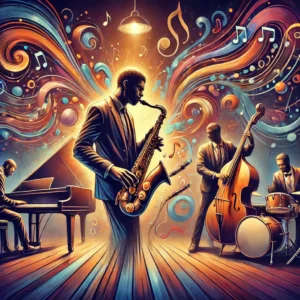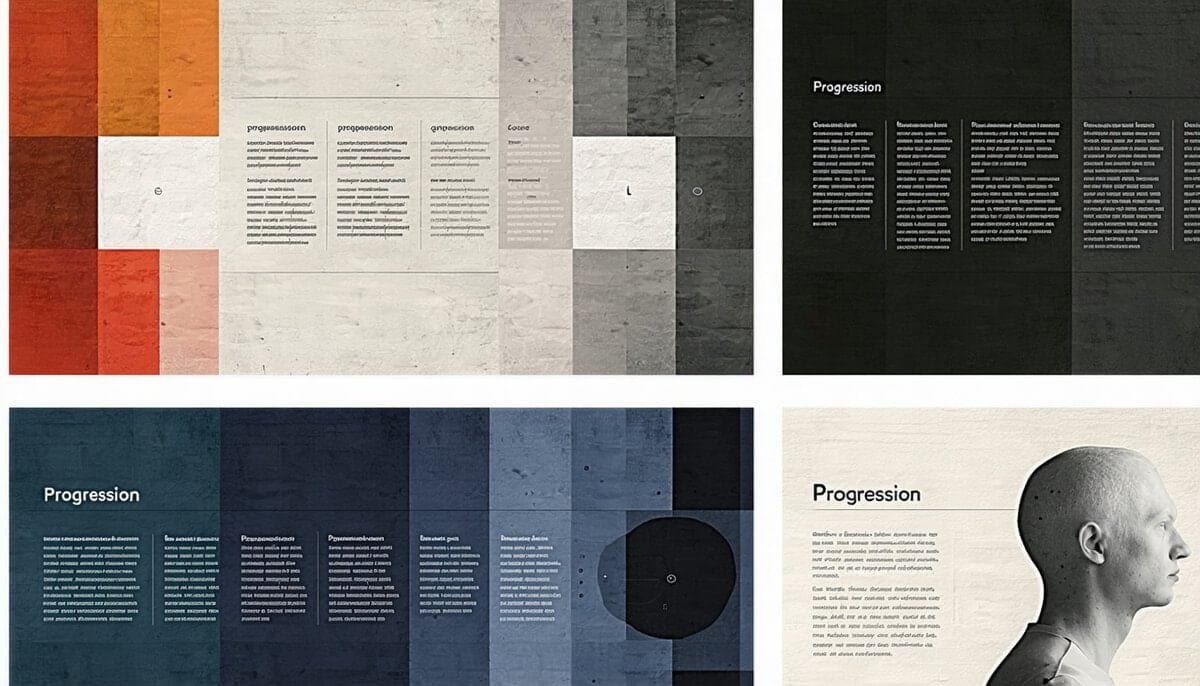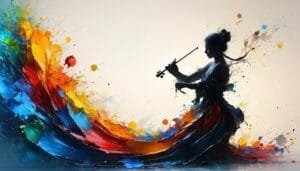If you wanna jazz up your piano skills, you need some solid improvisation techniques in your toolkit. Start with listening—like, really listening—to greats like Parker and Coltrane. They didn't rely solely on printed notes, and neither should you! Get comfortable with basic scales and chord progressions; it's like knowing the secret menu at your favorite diner. Don't forget to experiment and embrace your mistakes; they can lead to beautiful, unexpected melodies. Finally, find your personal style—think of it as creating your own weird signature dish. Stick around, and you'll reveal even more secrets to releasing your inner jazz genius!
Key Takeaways
- Master basic scales and chord progressions to build a solid foundation for improvisation.
- Engage in active listening to absorb techniques and styles from various jazz pianists.
- Experiment with different rhythms and phrasing to develop a unique musical voice.
- Regularly jam with other musicians to enhance creativity and explore new ideas.
- Embrace mistakes during improvisation as opportunities for growth and personal expression.
Historical Context of Jazz Learning
When you think about jazz learning, it's clear that the roots of this genre lie in immersive listening rather than textbooks. Seriously, who needs a textbook when you've got the soulful sounds of artists like Charlie Parker and John Coltrane?
These legends didn't just read about music; they listened, absorbed, and then added their own spice to the mix. It's all about oral traditions and peer learning—learning from each other while jamming in smoky clubs or maybe even your friend's basement, armed with nothing but a few chords and a whole lot of enthusiasm.
Now, let's face it: trying to memorize The Real Book can feel like cramming for a test you didn't study for. You might find yourself more confused than enlightened!
Instead, you should embrace the idea of personal exploration. Jazz isn't about being perfect; it's about finding your unique voice. You'll stumble, hit a wrong note or two—okay, maybe more than that—but each mistake brings you closer to your style.
The Journey of Jazz Improvisation
Jazz improvisation is an adventure that unfolds over a lifetime, filled with moments of inspiration and growth. Imagine diving into this world with an exploration mindset, where every note you play is a step into uncharted territory.
Sure, you're going to hit a few clunkers along the way—trust me, I've been there—but each mistake is just part of the journey, and hey, they can be hilariously bad!
Regular practice and jamming with others are like fuel for your creative freedom. You'll discover new ideas, enhance your skills, and realize that every musician's journey is unique.
Start by mastering the basics, like scales and chord progressions. They're the bread and butter of jazz, and believe me, you don't want to try improvising on an empty stomach!
As you grow, you'll notice your personal style blooming, like a musical flower that only you can nurture. Embrace the joy of exploration, letting your individual voice shine through the chaos.
Importance of Listening
Immersing yourself in the rich soundscape of jazz is essential for honing your improvisational skills. Trust me, you don't need to be a genius to appreciate how listening benefits your playing. Regularly jamming out to jazz exposes you to various styles, techniques, and those quirky nuances that make you go, "Wow, how did they do that?"
You can even sneak in a little jazz during your daily grind, whether you're stuck in traffic or trying to survive another workout.
High-quality listening gear can turn an ordinary experience into a musical journey, helping you catch every subtle note and trill that you might otherwise miss. And let's not forget about streaming services—it's like having a jazz library at your fingertips!
The more you listen, the deeper your connection to jazz becomes, which can work wonders for your improvisation skills. You'll find yourself naturally absorbing the tonalities and phrasing of those master artists, even if you still can't figure out how to play "Chopsticks" without messing it up.
Active Listening Techniques
Although listening to music might seem passive, engaging in active listening transforms your experience and understanding of jazz. Imagine this: you're not just lounging around with your earbuds, but you're diving headfirst into the music, giving it your focused attention. It's like giving a warm hug to your favorite jazz musician!
By honing your musical empathy, you'll start to appreciate the subtle nuances and improvisational choices that make each performance unique.
Try dedicating time to really listen to specific musicians or styles. I mean, who knew that zoning in on a single saxophonist could reveal a treasure trove of techniques?
You'll also learn to differentiate between high-quality recordings and those that sound like they were made in a garage—trust me, it matters! Regularly analyzing live performances is like having a backstage pass to the mind of a jazz genius.
Embrace this deeper connection with music and watch your improvisational skills flourish. You might even find yourself feeling inspired, ready to channel that energy into your own playing.
Caution With Jazz Education Resources
Listening to great jazz musicians can ignite your passion for improvisation, but it's important to approach jazz education resources with caution. Sure, they can be helpful, but if you rely too heavily on them, you might just end up sounding like a robot trying to swing.
Here's how to strike a good resource balance:
- Always prioritize personal exploration over strict adherence to materials.
- Use books like The Real Book for structure, but don't let them distract you from jamming with friends.
- Remember, there are no absolute rules in jazz—embracing this can help you break boundaries.
- Learn from recordings of master musicians; they'll teach you way more than any textbook can.
Jazz education can be a double-edged sword. You don't want to fall into educational pitfalls where you think you need to memorize every lick.
Instead, let the music flow naturally, and embrace your unique voice. It's about blending knowledge with authentic expression, so don't forget to play, explore, and maybe even make a few mistakes along the way.
After all, that's where the magic happens—and if you mess up, just call it "avant-garde"!
Essential Improvisation Techniques
Alright, let's talk about mastering chord progressions and developing melodic phrasing—two things I wish I'd figured out before my first gig, which, let's just say, was a bit of a disaster.
You'll want to get cozy with those chord changes and create melodies that not only sound good but also make sense; it's like making a musical sandwich where the bread is the chords, and the filling is your sweet, sweet melody.
Mastering Chord Progressions
When you immerse yourself in jazz improvisation, mastering chord progressions is essential for developing your skills and creativity at the piano.
Trust me, it's like learning to walk before you can run—except in this case, you might trip over your own fingers a few times.
But fear not! Here are a few tips to get you started:
- Nail the 12-bar blues: It's the backbone of many jazz solos. You'll find yourself improvising over I, IV, and V chords in no time.
- Experiment with chord voicings: Use different inversions to create smoother shifts. Your fingers mightn't always cooperate, but keep trying!
- Explore chord substitutions: Tritone substitutions and secondary dominants can add that extra zing to your playing—kind of like adding sprinkles to an already awesome cupcake.
- Practice common progressions: Solidify your skills with the classic 1 to 4 progression. Your brain will thank you later.
Incorporating voice leading techniques, like retaining common tones between chords, can really elevate your sound.
Developing Melodic Phrasing
Melodic phrasing in jazz is like painting a picture with sound, where each brushstroke contributes to the overall composition. You know, it's a bit like trying to tell a great story, but instead of words, you're using notes.
To truly master melodic development, you've gotta internalize those major and minor scales, like they're your best friends. When you do, improvisation flows out of you, almost like you've got a secret stash of musical ideas hidden under your piano.
Now, don't just plunk away like you're throwing darts at a board. Strong melodic phrasing comes from dynamic expression—think of it as giving your notes a personality.
Practice those ascending and descending patterns; they're like workout routines for your fingers, building strength and coherence in your solos.
And hey, don't shy away from experimenting with rhythmic variations! It's like adding sprinkles to your ice cream; it makes everything more exciting.
Developing a Personal Style
Finding your personal style in jazz is a bit like trying to bake a cake without a recipe—sure, you might end up with a gooey mess, but hey, at least it's your gooey mess!
By experimenting with different techniques and embracing your own musical influences, you can whip up something that truly reflects who you are.
Embrace Individual Musical Influences
Throughout your journey as a jazz pianist, embracing your individual musical influences can greatly enrich your improvisation skills.
Trust me, I've learned the hard way that if you try to sound like someone else, you might just end up sounding like a cat stuck in a piano! Instead, immerse yourself in your own musical diversity and let your unique experiences shine through.
Here are a few ways to tap into your personal influences:
- Explore Different Genres: Jazz isn't just about jazz. Rock, blues, or classical can add spice to your sound!
- Analyze Your Favorites: Take a closer look at what your favorite artists do, and figure out how to make it your own.
- Reflect Regularly: Spend some time thinking about what music truly speaks to you. It helps in finding your voice.
- Be Authentic: Remember, your journey is unique. Authenticity is way cooler than imitation.
Experiment With Unique Techniques
Experimenting with unique techniques is essential for developing your personal style as a jazz pianist. Think of it as a musical treasure hunt—sometimes, you've gotta dig through some dirt to find that shiny gem!
Start by playing around with unique voicings and melodic patterns. You might surprise yourself when you discover a sound that truly clicks with you.
Don't shy away from blending in elements from other genres; maybe a little funk here, a dash of blues there—who knows, you could invent a whole new flavor!
And hey, don't forget jazz idioms like slides and turns—they're not just fancy terms, they're your keys to adding flair to your improvisation.
Recording your sessions can be a game changer. You'll listen back, cringe a little, and then say, "Wow, did I really play that?" It's all part of the journey!
Plus, jamming with other musicians opens up a world of fresh ideas; it's like a musical potluck where everyone brings their own unique dish.
Foster Authentic Expression
To cultivate your authentic expression as a jazz pianist, embrace the unique life experiences and influences that shape your sound. Trust me, your personal experiences—like that time you flubbed a solo at the school talent show—can actually spark some of the best creative exploration.
Here are a few fun ways to get started:
- Experiment with sounds: Don't be afraid to slide, turn, or run through notes. Play around!
- Imitate, but innovate: Copy your favorite jazz legends, then add your twist. Think of it as jazz karaoke—just less embarrassing!
- Listen widely: Immerse yourself in diverse recordings. Sometimes, inspiration hits when you least expect it—like during your favorite breakfast cereal.
- Self-assess bravely: Be open to feedback. Yes, it might sting a bit, but it's like getting a haircut; sometimes you need a fresh perspective to show off your best self.
Building a Lifelong Practice Routine
While developing your skills as a jazz pianist, building a lifelong practice routine is essential for sustained growth and creativity. Now, I know what you're thinking—practice is about as exciting as watching paint dry. But hear me out! Establishing a consistent daily schedule is like giving yourself a musical treasure map. Dedicate time to technical exercises and improvisational exploration, and you'll build a strong foundation.
Set specific, achievable goals for each session. Maybe you want to master that tricky chord substitution or finally nail that rhythm you keep butchering. Trust me, those little victories add up. Record your sessions, too! It's like having a personal coach, but way less judgmental—unless you're really off-key.
Try mixing things up! Use focused listening, rhythmic variations, and other techniques to keep those creative juices flowing. Engage with fellow musicians online or at workshops. They can motivate you when you feel like giving up, which, let's be honest, is a common mood.
Conclusion
So, whether you're tickling the ivories like a pro or still figuring out which end of the piano is which, remember that improvisation is about freedom, not perfection. It's a wild ride of highs and lows—kind of like trying to dance in a crowded room while holding a plate of spaghetti. Embrace the messiness, keep practicing, and let your unique voice shine through. Jazz isn't just music; it's your chance to tell a story, even if it's a little offbeat!


